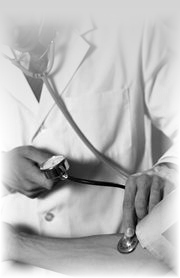 Medical Services
Medical Services
Cholesterol Management
Advanced Lipid Testing
Advanced Cholesterol Testing is a blood test -- your basic poke with a needle. The results break down both the good and bad cholesterol into subclasses that can give a better indication of heart-disease risk. Depending on the results, the tests may need to be repeated regularly.
Half the people who have heart attacks have normal cholesterol under traditional testing. Part of the problem is that the typical cholesterol test doesn't directly measure your LDL, or bad cholesterol. It just measures HDL (good cholesterol) and triglycerides, and then uses a formula to come up with an LDL score. But the formula can be unreliable, especially if your triglyceride count is high.
Expanded tests not only provide a direct measurement of LDL, but they also look at the size, type and sometimes number of LDL and HDL particles. A person with a low LDL score could actually have a lot of small LDL particles, putting him or her at higher risk for heart disease. And a person with very high HDL, thought to offer dramatic protection against heart disease, might not be getting as much protection as he thinks, because he can have too much of the wrong kind of HDL.
Insurance plans often will pay for the test if a person has known heart problems or other risk factors such as diabetes. But they usually won't pay for the tests in healthy people -- even though it is estimated that 40 million otherwise healthy people have hidden heart disease. Studies show the expanded tests could have detected 95% of heart-attack patients early.
The best-known expanded test is from Berkeley Heart Lab, the Burlingame, Calif., firm that licensed the test from University of California at Berkeley, where it was developed.
Another test made by Atherotech of Birmingham, Ala., is known as the VAP test (for vertical auto profile), and uses a high-speed centrifuge process to study particle size.
A third test, known as the NMR Lipoprofile (for nuclear magnetic resonance), uses soundwaves to measure the number of particles. It is made by LipoScience of Raleigh, N.C.
"We find things you don't find on a regular lipid profile" says Dr. Phillip Weinstein, who uses the NMR test. "If you really want to know absolutely whether you have any abnormal lipids or you might have some other findings, the only way to be sure is to get an expanded lipid profile."
Prime Healthcare Providers is not responsible for the content of any linked site. See our Terms and Conditions.

